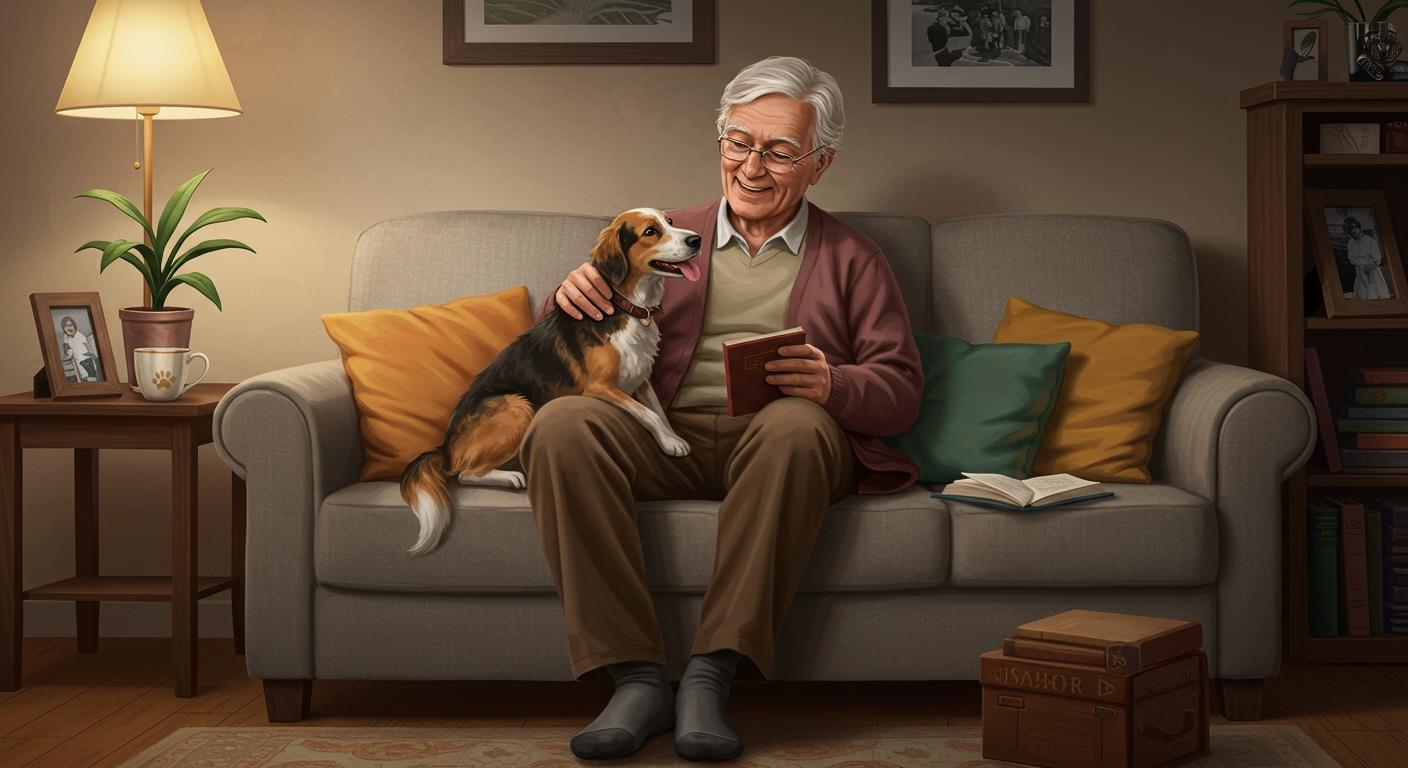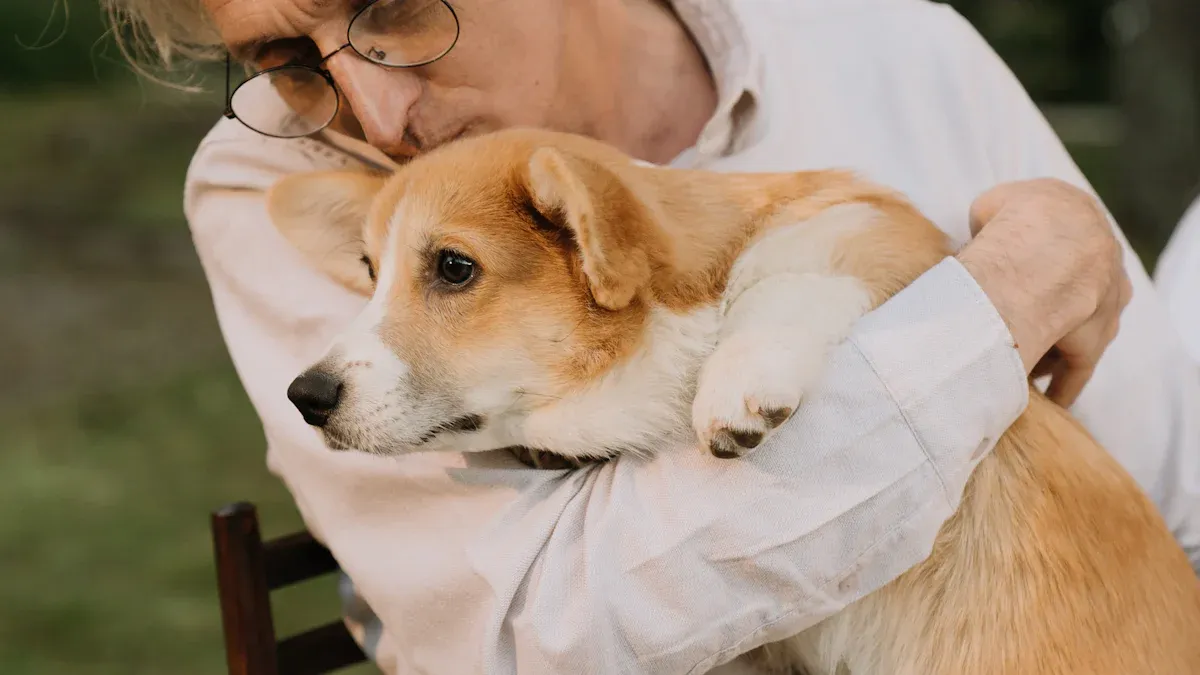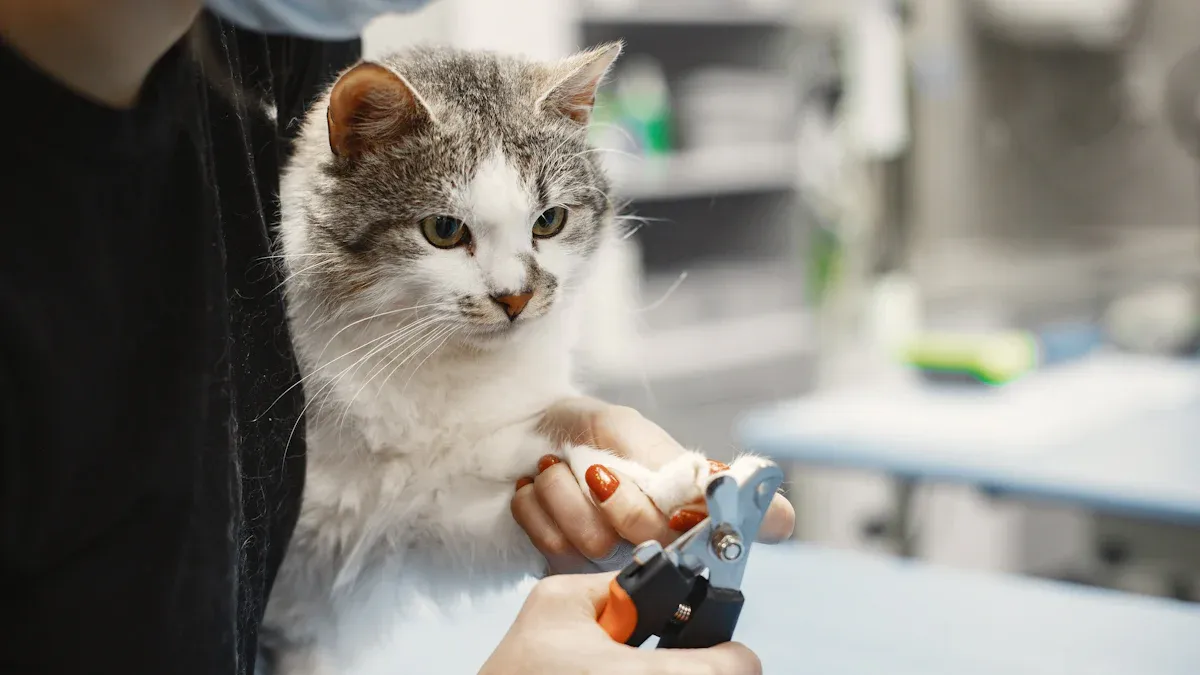Tips for Older Adults to Enjoy the Benefits of Pet Ownership

Having a pet can significantly enhance your happiness as they greet you when you come home. The benefits of pet ownership extend beyond companionship; pets help you feel more energetic, encouraging you to be more active and providing comfort. Many older adults enjoy the presence of pets, with more than half of them having furry companions. Pets play a vital role in helping older adults maintain their health and well-being, as they reduce feelings of loneliness and offer numerous positive aspects to their lives.
Key Takeaways
Pets help people feel happier and less lonely. They are good friends for older adults. Regular exercise with pets, like walking a dog, helps your body stay healthy. It can also lower your chance of getting heart disease. Picking the right pet means you should think about your daily life. You should also think about how much energy you have and what the pet needs for care.
Benefits of Pet Ownership
Physical Health
Having pets can help your health in many ways. You may walk more if you have a dog. Dog owners walk more than people without dogs. They are 34% more likely to walk 150 minutes each week. This extra walking is good for your heart. It also keeps your body strong. Pets help you move more, which is good for your balance. You might even lower your chance of falling.
Here are some ways pets help your body:
You exercise more, which keeps your muscles and joints strong.
People with heart disease who have pets have a 21% lower risk of death over 12 years.
Being with pets can lower your blood pressure and cholesterol.
Pets help you feel less stressed. Most pet owners say their animals help them relax.
You feel less lonely, which is good for your health.
Tip: Walking with your pet can give you more energy and help you keep a healthy routine.
Pets can also help with long-term health problems. Studies show that having a pet can lower your blood pressure when you are stressed. Dog owners often have fewer heart problems. Having a pet is linked to less high blood pressure. The American Heart Association says having a dog may lower your risk of heart disease.
Study Description |
Findings |
|---|---|
Study on hypertensive individuals |
People with pets had lower blood pressure during stress than those who only took medicine. |
Study on older pet owners |
Dogs were linked to lower blood pressure; cats had mixed results. |
Nationwide cohort study |
Dog owners had fewer heart risks and lived longer with heart disease. |
General population study |
Pet owners had less high blood pressure after other factors were considered. |
Mental Well-Being
Pets do more than help you stay active. They also help your mind. Spending time with your pet can make you happier and less stressed. Many older adults say pets help them feel less lonely. Your mood may get better when you play or cuddle with your pet.
Recent studies show pets can slow memory loss and help with thinking skills. If you live alone, a pet can make a big difference. Pets give you comfort and a reason to get up each day. Visits with therapy dogs can lower depression and anxiety in older adults.
Study Title |
Findings |
|---|---|
Pet Ownership Patterns and Successful Aging Outcomes in Community Dwelling Older Adults |
Pet ownership is linked to less depression, anxiety, and loneliness, but results are mixed. |
Pet ownership and maintenance of cognitive function in community-residing older adults |
Being with animals gives social support, helps you meet people, and lowers loneliness, which helps keep your mind sharp. |
Your pet can help you feel less alone. Older adults who are alone often turn to pets for company. This bond helps you talk to others and keeps your mind healthy.
Note: Spending time with your pet each day can help you feel calm and focused. Pets give comfort and help you handle stress.
Social Connection
Pets help you meet new people. Walking your dog or talking about your cat can start conversations. Pets help you make friends. Many older adults say pets help them feel less lonely and more connected.
Research shows that animal-assisted therapy helps people feel less lonely and act more social. Being with pets can help you make new friends. Pet owners are 36% less likely to feel lonely.
Study |
Findings |
|---|---|
Barker & Wolen, 2008 |
Pets help people feel less lonely. |
Banks & Banks, 2002 |
Animal-assisted therapy helps older adults feel less lonely and act more social. |
Bernstein, Friedmann, & Malaspina, 2000 |
Pets help start conversations and help people be more social. |
Krause-Parello, 2012 |
Studies show pets help older women feel less lonely. |
Garrity et al., 1989 |
Older adults with fewer friends feel less sad if they have pets. |
Robb & Stegman, 1983 |
No big difference in well-being between pet owners and non-pet owners among male veterans. |
General Findings |
Pet owners are 36% less likely to feel lonely than people without pets. |
85% of people say being with pets helps them feel less lonely.
72% think pets are good for their community.
You may see that your pet helps you feel less alone. Pets help you go outside, join groups, and talk to others. Pets help you build a support system and feel better.
Callout: Pets are great friends. They help you stay active, support your mind, and help you meet others. Pets can really make your life better.
Pets for Older Adults

Choosing the Right Pet
Picking the right pet can make your life easier and more joyful. You want a companion that fits your daily routine and matches your energy. Not every animal suits every person, so think about what works best for you. Here are some things to keep in mind when looking at pets for older adults:
Size and Activity Level: Choose a pet that matches your strength and living space. Smaller dogs or cats often work well if you have limited mobility.
Care and Grooming Needs: Some pets need lots of brushing, walks, or special food. Make sure you can handle the care they need.
Allergies and Sensitivities: If you have allergies, look for hypoallergenic breeds or pets with less fur.
Lifespan and Long-Term Commitment: Think about how long the pet might live. Make sure you feel ready for the years ahead.
Tip: Take your time. Visit shelters or breeders and spend time with different animals. You will know when you find the right match.
Dogs, Cats, Small Pets
You have many choices when it comes to pets. Dogs, cats, and even small pets like fish each offer something special. Let’s look at what makes each type unique for older adults.
Pet Type |
Popularity (%) |
Benefits for Seniors |
|---|---|---|
Dogs |
Affectionate, loyal, protective, helpful, playful |
|
Cats |
43% |
Independent, low maintenance, good companionship |
Fish |
14.7% |
Low-maintenance, relaxing to watch, easy care |
Dogs love to play and go for walks. They help you stay active and give you a reason to get outside. Cats are more independent. They like to cuddle but do not need as much attention. Fish are easy to care for and bring a sense of calm to your home.
Here are some pros and cons to think about:
-
Pros:
Pets help you exercise and keep your body strong.
They lower stress and help your heart stay healthy.
You meet new people when you walk your dog or talk about your pet.
Pets give you a sense of purpose and help you bond with family.
-
Cons:
Some pets need a lot of care, which can be hard if you have health problems.
You may need help if you travel or have an emergency.
Vet bills and supplies can cost more than you expect.
Note: Think about your daily life. If you want a playful friend, a dog might be best. If you like quiet time, a cat or fish could be perfect.
Adopting Rescue Animals
Adopting a rescue animal brings many rewards. Senior pets often have calm personalities and need less training. You get instant companionship and a loving friend who is grateful for a second chance. Many older adults find that adopting a rescue pet makes the bond even stronger.
-
Benefits of adopting rescue pets:
You gain a loyal companion.
Older pets have settled personalities, so you know what to expect.
You save a life and give a pet a loving home.
-
Challenges to consider:
Some pets may have health needs or need more vet visits.
You need to think about your own mobility and ability to care for them.
It can be emotional to care for an older pet, so plan for the future.
Many shelters offer "Seniors for Seniors" programs. These programs often lower or waive adoption fees for older adults who adopt senior pets. Some groups even help with vet care or check in to make sure you and your pet are happy together.
Callout: Adopting a rescue pet can change both your life and theirs. You give them a home, and they give you love and friendship.
Preparing for Pet Ownership
Financial Planning
Before you bring home a new friend, you should look at your budget. Owning pets means you pay for food, vet visits, and supplies every year. Here’s a quick checklist to help you plan:
Food costs can range from $300 to $1,000 each year, depending on your pet’s size and needs.
Routine veterinary care usually adds $80 to $400 for checkups and shots.
Dogs may cost $400 to $2,000 per year, while puppies can reach $2,500.
Adult cats often cost between $400 and $1,800 yearly.
Flea, tick, and heartworm prevention can add $40 to $250.
If you need help with pet care costs, some programs can help. RedRover offers help for urgent vet care. The Pet Fund helps with non-emergency bills. Meals on Wheels gives pet food and vet services to seniors. You can also ask neighbors or local groups for support.
Tip: Make a list of your monthly expenses before you adopt. This helps you avoid surprises.
Time Commitment
Pets need your time and attention every day. Dogs need at least 30 minutes of walking twice a day. Cats like daily play with toys. Small pets, like gerbils or hamsters, need fresh food and water each day. Pocket pets such as guinea pigs and rabbits need daily handling and play. If you want a low-maintenance pet, choose one that fits your schedule.
Here’s a simple daily routine for pet care:
Feed your pet at the same time each day.
Give fresh water.
Spend time playing or walking.
Check for signs of illness.
Home Safety
You want your home to be safe for both you and your pets. Simple changes can make a big difference. Look at this table for ideas:
Modification Type |
Description |
|---|---|
Flooring Solutions |
Use rugs with non-slip backing or yoga mats for better traction. |
Managing Stairs |
Install baby gates or pet ramps to help pets move safely. |
Creating Comfort Zones |
Provide orthopedic beds and resting spots for comfort. |
Mealtime Modifications |
Use elevated bowls to help pets with arthritis. |
Mobility Support |
Use harnesses or slings for pets with mobility issues. |
Note: Regular vet visits and good hygiene keep your pets healthy and happy. Clean bowls and bedding often.
Daily Care Tips

Routine and Exercise
Building a daily routine helps both you and your pets feel secure. When you set regular times for feeding, walks, and play, your furry friend knows what to expect. This structure reduces anxiety and keeps everyone happy. Try these tips for caring for a pet each day:
Tailor exercise to your pet’s age and health. Senior dogs do best with about 30 minutes of gentle activity, like short walks or easy play.
Mix in mental games, such as teaching new tricks or using puzzle toys.
Break activities into short sessions to avoid tiring your pet.
Watch for signs of overexertion, like limping or heavy panting, and adjust as needed.
A steady routine helps your pet stay fit, keeps their mind sharp, and prevents behavior problems.
You also benefit from regular exercise. Walking your dog or playing with your cat boosts your own health. You move more, support your heart, and even help your brain stay sharp.
Hygiene
Keeping things clean is a big part of caring for a pet. Good hygiene protects both you and your pets from germs. Here are some simple habits to follow:
Wash your hands after playing with your pet or cleaning up after them.
Clean the litter box every day to lower the risk of parasites.
Keep pet food and supplies out of the kitchen.
Disinfect pet beds, bowls, and toys often, and do it outside if you can.
Pick up after your pet during walks.
A tidy home makes your pet comfortable and healthy. Supportive bedding, fresh water, and a clean space help prevent illness.
Vet Visits
Regular checkups are key when caring for a pet, especially as they get older. Senior pets should see the vet every six months. These visits help catch problems like arthritis or kidney disease early. Your vet may suggest blood tests or X-rays to spot hidden issues.
Wellness exams include checking teeth, weight, and overall health.
Vaccinations and dental care keep your pet safe.
Your vet can help you adjust diet and exercise as your pet ages.
Staying on top of vet visits means your pets get the best care and you enjoy more happy years together.
Overcoming Challenges
Holidays and Absence
You may feel worried about your pets when you travel. Senior pets feel safer if they stay in their own home. You can hire pet sitters who know how to care for older pets. These sitters also keep your pet company. If you use a boarding place, choose one that knows about senior pets. Always write down clear steps for your pet’s care. Give your emergency plan to the sitter so they know what to do.
Keep pets at home if you can
Hire skilled in-home sitters
Pick boarding places with senior pet knowledge
Write out care steps in detail
Make an emergency plan
Health Concerns
Pets bring happiness, but you must think about health. Plan your money for food, vet visits, and extra help. Check if you can do daily jobs like feeding and walking. If you are new to pets, try fostering first. This helps you see if you can handle it. Make a plan for surprises. Ask friends or family to help if you get sick. Look at your home and pick a pet that fits your space.
Check if you can do daily tasks
Try fostering before adopting
Set up help for emergencies
Choose a pet that fits your home
Support Resources
There are many ways to get help with pets. Professional caregivers can help with daily care. Pet programs give support for special needs. Automatic feeders make meals easy. Mobile vets come to your house for check-ups. Money tips help you pay for pet care. Knowing these choices makes having a pet easier. Pets give you friendship and help you meet people.
Pet help programs
Automatic feeding tools
Mobile vet services
Money management tips
Alternatives to Pet Ownership
Volunteering
You do not need to own a pet to enjoy animals. You can help at animal shelters or rescue groups. Volunteering lets you care for animals that need help. You will meet other people who love animals. You can make new friends while you help. You will stay busy and feel like you have a purpose. Many groups have events where you can learn about animal care. You can spend time with pets even if you cannot have one at home.
You meet new people and make friends.
You stay active and take part in your community.
Fostering
Fostering lets you care for pets without keeping them forever. You give animals a safe and loving place to stay. Many older adults like fostering because it is flexible. You can change your schedule to help the pet. Your calm home is good for pets that need peace. Fostering keeps you busy and gives you company, especially if you live alone.
Fostering gives you company without a lifelong promise.
You help pets heal and get ready for new homes.
You stay busy and feel important.
Therapy Animals
Therapy animals visit places like hospitals and nursing homes. These animals bring happiness and comfort to many people. Studies show therapy animals help lower stress and make people feel better. They also help people feel less lonely and more connected.
Study |
Findings |
|---|---|
Friedmann & Son (2009) |
Human-animal bonds lower stress and increase well-being. |
Cherniack & Cherniack (2014) |
Therapy animals improve mood and reduce loneliness. |
Banks & Banks (2002) |
Animal visits decrease isolation in care facilities. |
Souter & Miller (2007) |
Pet therapy helps treat depression. |
Note: Therapy animals can help your feelings and make you feel cared for.
Honoring Pets with Pawimprint
If you want to remember a special pet, Pawimprint has nice ways to do it. You can get a custom pet portrait, a 3D crystal, or a wool felt portrait. These items help you remember happy times with your pet. Many people like having a special place at home for a portrait or keepsake. Pawimprint’s items start at $28.90, so you can find something for any budget. Each keepsake is made with care so you can keep your memories for a long time.
Research shows pets boost your health, mood, and social life.
You can enjoy companionship, purpose, and joy with the right pet.
Pick a pet that fits your lifestyle and energy.
Prepare for care and costs.
If full-time ownership feels tough, try volunteering or fostering. Start your journey and let a pet brighten your days!
FAQ
What if you feel anxiety about caring for a pet?
You might worry about pet care. Try breaking tasks into small steps. Pets can help lower anxiety and make you feel calm. Ask friends for help.
Can pets help with depression in older adults?
Yes, pets can lift your mood. Spending time with animals may reduce depression. You feel happier when you play or cuddle with your pet. Pets give comfort.
How do you handle anxiety or depression when your pet gets sick?
You may feel anxiety or depression if your pet is ill. Talk to your vet. Stay positive. Focus on small joys. Pets need your love and support.
Tip: If anxiety or depression feels overwhelming, reach out to a counselor or support group. You are not alone.
